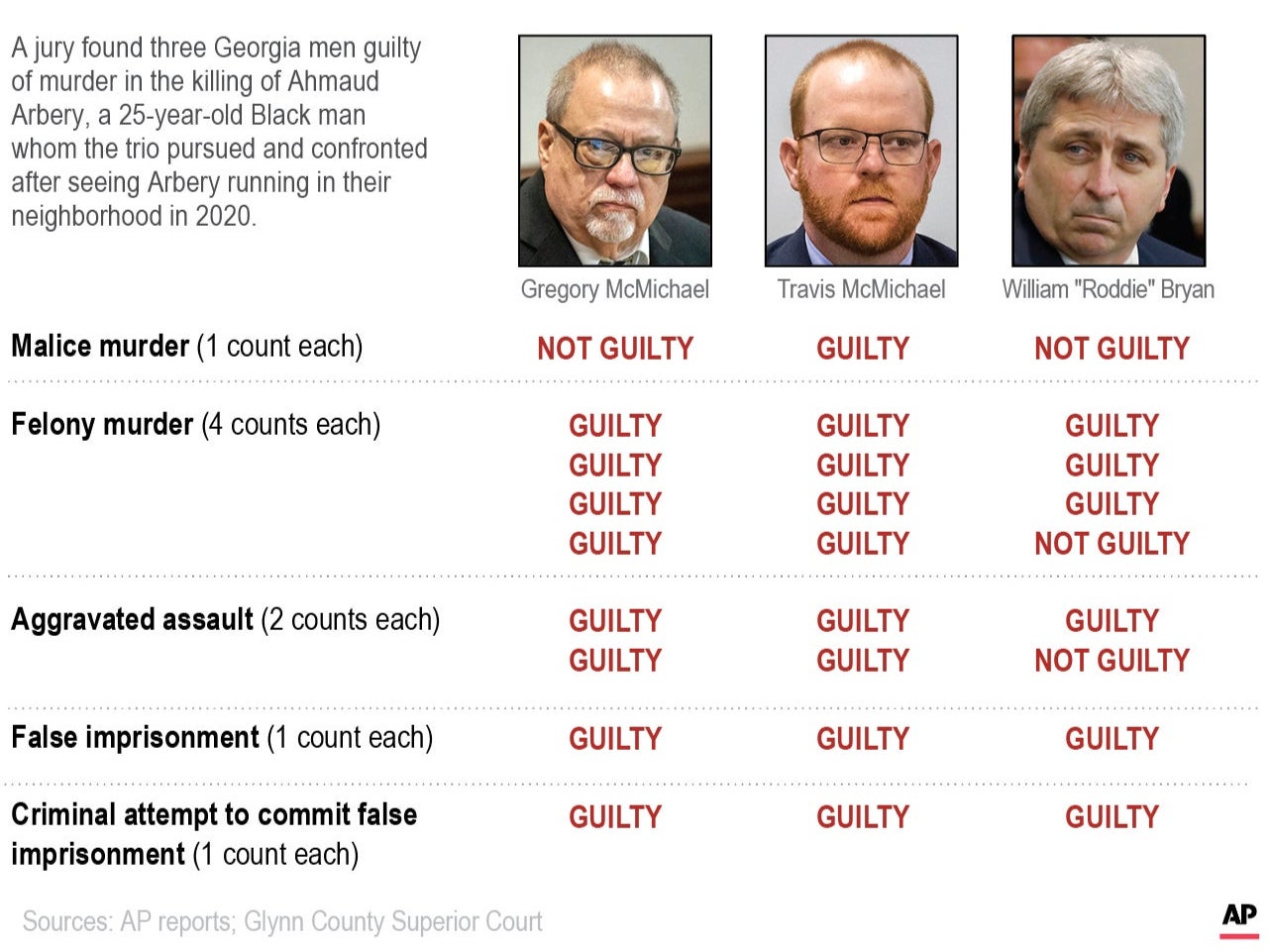Ahmaud Arbery: Three white men convicted of murder to face federal hate crimes trial
Jury selection will begin in February after Justice Department accused three white men of targeting Ahmaud Arbery for his race
The men convicted of murdering Ahmaud Arbery on 24 November will return to court in February for a federal hate crimes trial, after the US Department of Justice determined they targeted the Black Georgia man because of his race.
In April, a federal grand jury indicted Travis McMichael and his father Gregory McMichael and William Bryan for civil rights violations and attempted kidnapping. The McMichaels also were charged with one count each of using, carrying, and brandishing a firearm used to kill Mr Arbery.
The McMichaels had “armed themselves with firearms, got into a truck and chased Mr Arbery through the public streets of a neighborhood while yelling at [Mr Arbery], using their truck to cut off his route and threatening him with firearms,” according to a federal indictment.
The indictment also alleges that the men “attempted to unlawfully seize and confine [Mr Arbery] by chasing after him in their trucks in an attempt to restrain him, restrict his free movement, corral and detain him against his will, and prevent his escape”.
Jury selection in the hate crimes trial is scheduled to begin on 7 February, 2022 in US District Court in Brunswick, Georgia – nearly two years after the men killed Mr Arbery on 23 February, 2020.
More than two months passed before the men were charged for killing Mr Arbery at point-blank range with a shotgun, after phone-recorded video of the shooting leaked online and sparked international outrage and allegations that the men committed a “modern-day lynching” of a Black man.
The men were arrested on 7 May.
According to the Georgia Bureau of Investigation, Mr Bryan told investigators that Travis McMichael, after shooting Mr Arbery, used a racist slur as he stood over his body.
The men faced nine state charges for killing Mr Arbery, including malice murder as well as felony murder, false imprisonment, aggravated assault with a 12-gauge shotgun, and aggravated assault with pickup trucks. Georgia defines malice murder as the “deliberate intention unlawfully to take the life of another human being”, similar to a first-degree murder charge.
Travis McMichael, the man who shot Mr Arbery, was found guilty on all nine counts.
Gregory McMichael, who rode in the truck with his son, was found guilty on all counts except malice murder. Bryan, their neighbour, who joined the pursuit in his own truck and filmed the killing was found not guilty of malice murder and one count of felony murder but was found guilty on three other counts of felony murder and three other charges.
They face life in prison.

The men were not charged with state-level hate crimes because Georgia was among only a handful of states without such statutes until after Mr Arbery’s death.
Following international outcry over the killing of Mr Arbery, Georgia lawmakers accelerated passage of a hate crime bill in June 2020, and Governor Brian Kemp signed it into law that month, despite delayed attempts to pass such measures in previous years.
State lawmakers first passed hate crimes legislation in 2000, but the state’s Supreme Court tossed out the law it characterised as “unconstitutionally vague”. Another attempt only narrowly passed the Georgia House of Representatives in 2019 and languished in a state Senate committee.
Georgia’s new law strengthens penalties against those who commit crimes against someone because of their race, gender, sexual orientation, and mental and physical disabilities, among other protected groups. It also requires law enforcement to file reports of any such crimes to be tracked by the state.
Subscribe to Independent Premium to bookmark this article
Want to bookmark your favourite articles and stories to read or reference later? Start your Independent Premium subscription today.

